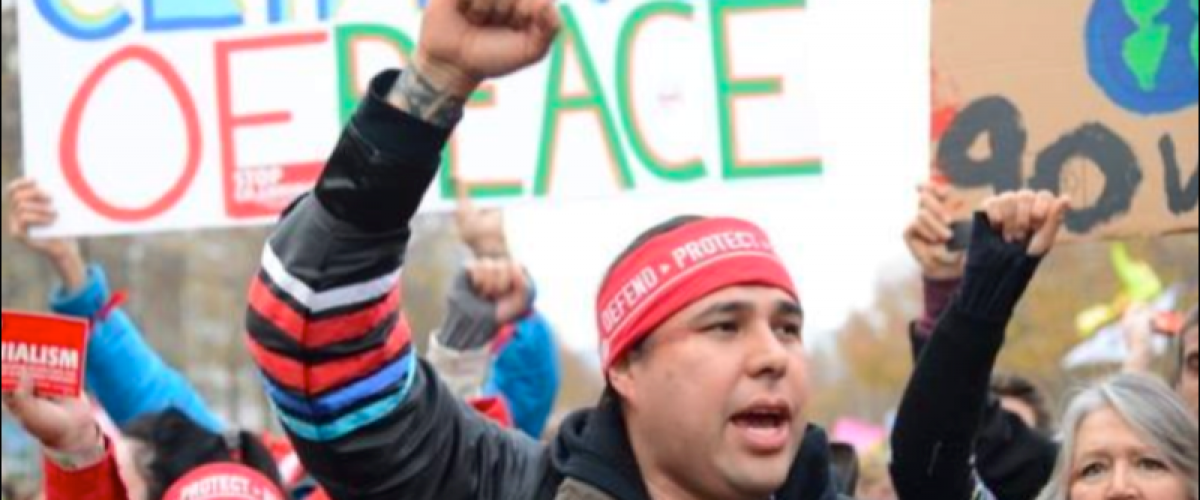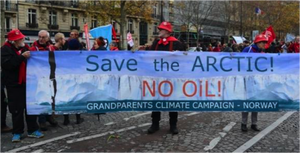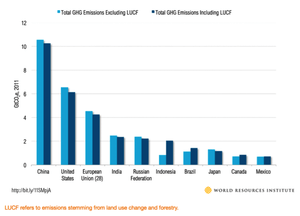The Cousteau Society follow the resolutions of the COP21 in the Streets among the civil society
The 2015 United Nations Climate Change Conference, COP 21 was held in Paris, France, from 30 November to 12 December 2015.
The agreement approved in Paris is not yet the best achievement and it is a long way from answering all the demands. But it is definetely an important step toward a post-carbon society. We can rejoice that the 1,5°C is clearly mentioned and the target of zero emissions by the second half of the century as well. This resolution places the fossil fuel industry as part of History. We now leave the COP21, peacefully supported by civil society engagements, who care about our blue planet and who are confident that change is possible !
Is this sufficient to make a sustainable society ? Of course not ! We need to consider not only carbon footprints, but also to solve the 6th mass extinction of the species that we are causing. We need to not only allow the big players, the usual suspects, to make more money and speculate on the green and post carbon related high technologies, but to solve the dreadful problem of social inequality. The nations which have caused most of the climate problems are still promising too little to the people who suffer from climate change in developing countries. But still, despite all the challenges we still have to face, something happened in Paris during COP21 that will be part of History. The Cousteau Society walked with the civil society through the streets of Paris on the 12th of December during the final annoucement of COP21. It was great to see the beauty of diverse people, caring for our planet and for their brothers and sisters. People from the whole world, different cultures, different arguments, however the borders were vanished for a while, the Parisian streets were South American, Asian, European, African, Australian, from the Ocean, the Polar Areas and from the rain forests! And if there is hope, it is certainly promoted by those beautiful and connected hearts, who walked together side by side to create the fairer and greener society that we need.
What is COP ?
The Conference was the 21st session of the Conference of the Parties (COP) to the 1992 United Nations Framework Convention on Climate Change (UNFCCC) and the 11th session of the Meeting of the Parties to the 1997 Kyoto Protocol. The COP meets every year, unless the Parties decide otherwise.
According to the United Nations the main task of the COP is to review the national communications and emission inventories submitted by Parties. Based on this information, the COP assess the effects of the measures taken by Parties and the progress made in achieving the ultimate objective of the Convention.
Key points of COP21 agreement regarding the Ocean :
– On 12 December 2015 the 195 participating countries agreed by consensus to the final Paris Agreement, to reduce greenhouse gas emissions, but the agreement doesn’t mandate exactly by how much each country must reduce its emissions.
– In the 12-page draft document, which will be signed next year, the members agreed to reduce their carbon output “as soon as possible” and to do their best to keep global warming “to well below 2° C”.
– In the adopted version of the COP21 agreement, the parties will also “pursue efforts ” to limit the temperature increase to 1.5°C. According to scientists, the 1.5°C goal will require zero emissions sometime between 2030 and 2050.
– For the first time in the Climate Change Conference history the Ocean was mentioned, as shown in the following preamble “Noting the importance of ensuring the integrity of all ecosystems, including oceans…”. However, the ocean is still in a second plan compared to the importance of forests, which was mentioned 11 times.
– The agreement calls for developed countries to raise at least $100 billion annually in order to assist developing countries.
– The objective of reducing greenhouse gas emissions from aircrafts and merchant marine vessels has long been part of the draft agreements. But on the 9th of December, this reference was removed from the text. Aircrafts contribute to 2.5% of global CO2 emissions and marine vessels 2.2%. But mainly their emissions are increasing two times faster than the global average since 1980, according to the journal Nature Climate Change.
– There is a single reference to renewable energy, in order to help the electrification of Africa. Despite it not being clear in the agreement there is a call for renewable energy as a science resource. There were also few mentions denouncing fossil fuels and only one reference text suggests creating a tool as the “carbon price”.
Side-agreements regarding the Ocean :
– The declaration « Because the Ocean », a commitment among Heads of State and National Delegations from 22 countries. The aim of this declaration is to prepare, in 2016, an action plan dedicated to the ocean, as part of the UNFCCC.
Which measures do the countries plan to adopt to reach the agreement?
Kumi Naidoo of Greenpeace said to CNN that the agrement is a new imperative and positive step and is quoted to have said “we have a 1.5-degree wall to climb, but the ladder isn’t tall enough”.
One of the main achievements of the COP21 was having the participation of USA and China among the member states that approved the commitement.
The 2015 United Nations Climate Change Conference, COP 21 was held in Paris, France, from 30 November to 12 December 2015.
The agreement approved in Paris is not yet the best achievement and it is a long way from answering all the demands. But it is definetely an important step toward a post-carbon society. We can rejoice that the 1,5°C is clearly mentioned and the target of zero emissions by the second half of the century as well. This resolution places the fossil fuel industry as part of History. We now leave the COP21, peacefully supported by civil society engagements, who care about our blue planet and who are confident that change is possible !
Is this sufficient to make a sustainable society ? Of course not ! We need to consider not only carbon footprints, but also to solve the 6th mass extinction of the species that we are causing. We need to not only allow the big players, the usual suspects, to make more money and speculate on the green and post carbon related high technologies, but to solve the dreadful problem of social inequality. The nations which have caused most of the climate problems are still promising too little to the people who suffer from climate change in developing countries. But still, despite all the challenges we still have to face, something happened in Paris during COP21 that will be part of History. The Cousteau Society walked with the civil society through the streets of Paris on the 12th of December during the final annoucement of COP21. It was great to see the beauty of diverse people, caring for our planet and for their brothers and sisters. People from the whole world, different cultures, different arguments, however the borders were vanished for a while, the Parisian streets were South American, Asian, European, African, Australian, from the Ocean, the Polar Areas and from the rain forests! And if there is hope, it is certainly promoted by those beautiful and connected hearts, who walked together side by side to create the fairer and greener society that we need.
What is COP ?
The Conference was the 21st session of the Conference of the Parties (COP) to the 1992 United Nations Framework Convention on Climate Change (UNFCCC) and the 11th session of the Meeting of the Parties to the 1997 Kyoto Protocol. The COP meets every year, unless the Parties decide otherwise.
According to the United Nations the main task of the COP is to review the national communications and emission inventories submitted by Parties. Based on this information, the COP assess the effects of the measures taken by Parties and the progress made in achieving the ultimate objective of the Convention.
Key points of COP21 agreement regarding the Ocean :
– On 12 December 2015 the 195 participating countries agreed by consensus to the final Paris Agreement, to reduce greenhouse gas emissions, but the agreement doesn’t mandate exactly by how much each country must reduce its emissions.
– In the 12-page draft document, which will be signed next year, the members agreed to reduce their carbon output “as soon as possible” and to do their best to keep global warming “to well below 2° C”.
– In the adopted version of the COP21 agreement, the parties will also “pursue efforts ” to limit the temperature increase to 1.5°C. According to scientists, the 1.5°C goal will require zero emissions sometime between 2030 and 2050.
– For the first time in the Climate Change Conference history the Ocean was mentioned, as shown in the following preamble “Noting the importance of ensuring the integrity of all ecosystems, including oceans…”. However, the ocean is still in a second plan compared to the importance of forests, which was mentioned 11 times.
– The agreement calls for developed countries to raise at least $100 billion annually in order to assist developing countries.
– The objective of reducing greenhouse gas emissions from aircrafts and merchant marine vessels has long been part of the draft agreements. But on the 9th of December, this reference was removed from the text. Aircrafts contribute to 2.5% of global CO2 emissions and marine vessels 2.2%. But mainly their emissions are increasing two times faster than the global average since 1980, according to the journal Nature Climate Change.
– There is a single reference to renewable energy, in order to help the electrification of Africa. Despite it not being clear in the agreement there is a call for renewable energy as a science resource. There were also few mentions denouncing fossil fuels and only one reference text suggests creating a tool as the “carbon price”.
Side-agreements regarding the Ocean :
– The declaration « Because the Ocean », a commitment among Heads of State and National Delegations from 22 countries. The aim of this declaration is to prepare, in 2016, an action plan dedicated to the ocean, as part of the UNFCCC.
Which measures do the countries plan to adopt to reach the agreement?
Kumi Naidoo of Greenpeace said to CNN that the agrement is a new imperative and positive step and is quoted to have said “we have a 1.5-degree wall to climb, but the ladder isn’t tall enough”.
One of the main achievements of the COP21 was having the participation of USA and China among the member states that approved the commitement.
China and the United States, respectively, account for about 24% and 14% of total greenhouse gas emissions, according to the World Resources Institute.
Acording to the magazine Scientific American, the U.S. will double the speed of its current pollution reduction trajectory, which has seen CO2 emissions fall 10 percent below 2005 levels until now. The country will now have to reduce greenhouse gas emissions 26 to 28 percent below 2005 levels by 2025.
The Chinese strategy is building even more nuclear power plants, wind farms, hydroelectric dams and to start employing more solar power with the objective to add as much as 1,000 gigawatts (20 percent of its energy) of these low-carbon emitting sources by 2030.
At the same time, the U.S. and China will continue to collaborate on developing the kind of CO2 capture and storage (CCS) that could help clean coal-burning for power plants but also industry, such as steel and cement-making.
Sources: Agreement COP21, UNFCCC, Scientific American, Le Figaro, World Resources Institute, CNN, Le Monde





